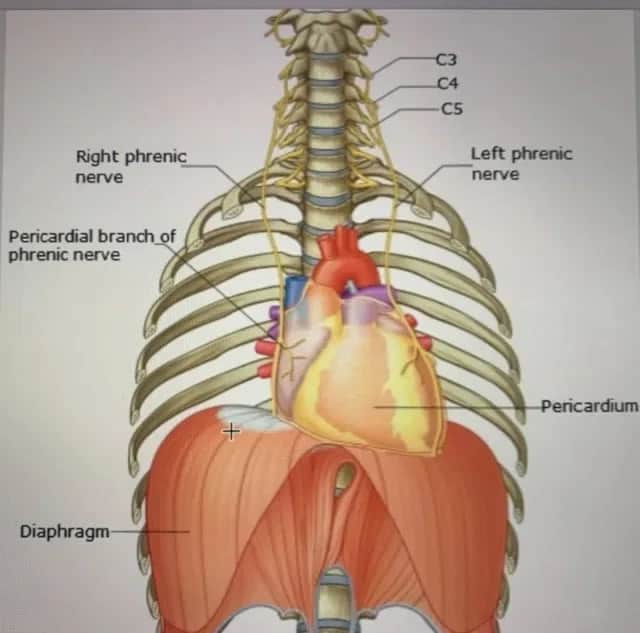
Dysfunctional movement patterns of the neck and shoulder are connected to proper breathing techniques and the function of the diaphragm.
The diaphragm may be our muscle of respiration, but it’s more than just breath. It has an impact on all of our major physiological systems; posture, rib cage mobility, circulation, blood pressure, asthma, immune function, digestion, acid reflux, cold feet, varicose veins, the proper function of the core muscles, and emotional health(anxiety, stress, etc).
You may be wondering how is my neck problem connected to the diaphragm?

Trust me, it has everything to do with your neck!
The diaphragm is innervated by the phrenic nerve which also runs through the cervical vertebra C3-C5. Any compromise in the neck joints will affect the integrity and function of the diaphragm.
In addition, the diaphragm has a connection to the vagus nerve which is responsible for the regulation of internal organ functions, such as digestion, heart rate, respiratory rate, and certain reflex actions, such as coughing, sneezing, swallowing, and vomiting.
The diaphragm also has massive attachments to multiple organs and muscles. If there is any dysfunction with the diaphragm it can inhibit the function of major core muscles and back muscles which will contribute to poor core stability. This will not only affect the back, but also the neck and shoulder.
Often times I see patients compensating with their neck muscles for the lack of stability in their core muscles. Over time, this creates stiffness, pain, and stress on the neck. This creates dysfunctional movement patterns leading to poor mobility, arthritis, and decreased function.
In addition, it is not uncommon for people to breathe using their neck muscles instead of optimizing their diaphragm function. This causes tightness and over facilitation of the neck muscles which creates dysfunctional movement patterns in the neck and shoulder.
The bottom line: The diaphragm is our chief inhalation muscle and must be optimized for our body to function properly.
Bonus Tip: Optimizing your diaphragm is key to improving your neck and shoulder function along with your entire body!
Sadly, most physical therapists don’t address the importance of proper diaphragm function during their evaluation.
Here at Custom Fit Physical Therapy, we discover the root cause of your problem and address the whole body not just where you are having symptoms. This is key to optimal healing!
If you are experiencing neck, back, or shoulder pain and it hasn’t improved, schedule a call with us to gain clarity on what your best options are to get to the root cause of the problem.
We want you to make the best decision about your health so that you can get back to the things you love to do!


